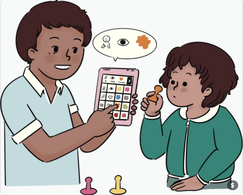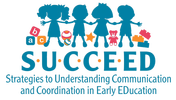 It’s October and that means it’s International AAC Awareness Month! Check out the special promotions, in-services, webinars, and user spotlights throughout the month to learn more about AAC from speech-language pathologists and AAC users themselves. Our very own Kaitlyn Flynn, M.S. CCC-SLP, and Michelle Carter, M.S. CCC-SLP, will be doing an in-service presentation on AAC. Stay tuned for information on the date and time of this presentation. What is AAC? AAC stands for Augmentative and Alternative Communication. AAC can be high-tech, low-tech, or no-tech. High-tech AAC includes the use of an app on an iPad or a speech-generating device, low-tech AAC includes the use of materials such as paper and pencil to write or draw, and no-tech AAC includes the use of gestures, expressions, and signs. Why is AAC important? AAC provides individuals with the opportunity to communicate. It can be used to augment existing speech and language, or it can be used as an alternative method to verbal speech. It gives everyone the opportunity to participate in conversations and activities with peers, friends, and family. Who can benefit from AAC? Any individual who is nonverbal, or verbal, can benefit from AAC. Contrary to the beliefs of many, AAC does not discourage speech, but rather encourages and often increases speech productions in users. Where can I get started? Reach out to an SLP if you are interested in AAC for you or your child.
0 Comments
Leave a Reply. |
AuthorWrite something about yourself. No need to be fancy, just an overview. Archives
December 2022
Categories |
Location6035 Bird Road
Miami, FL 33155 |
|
